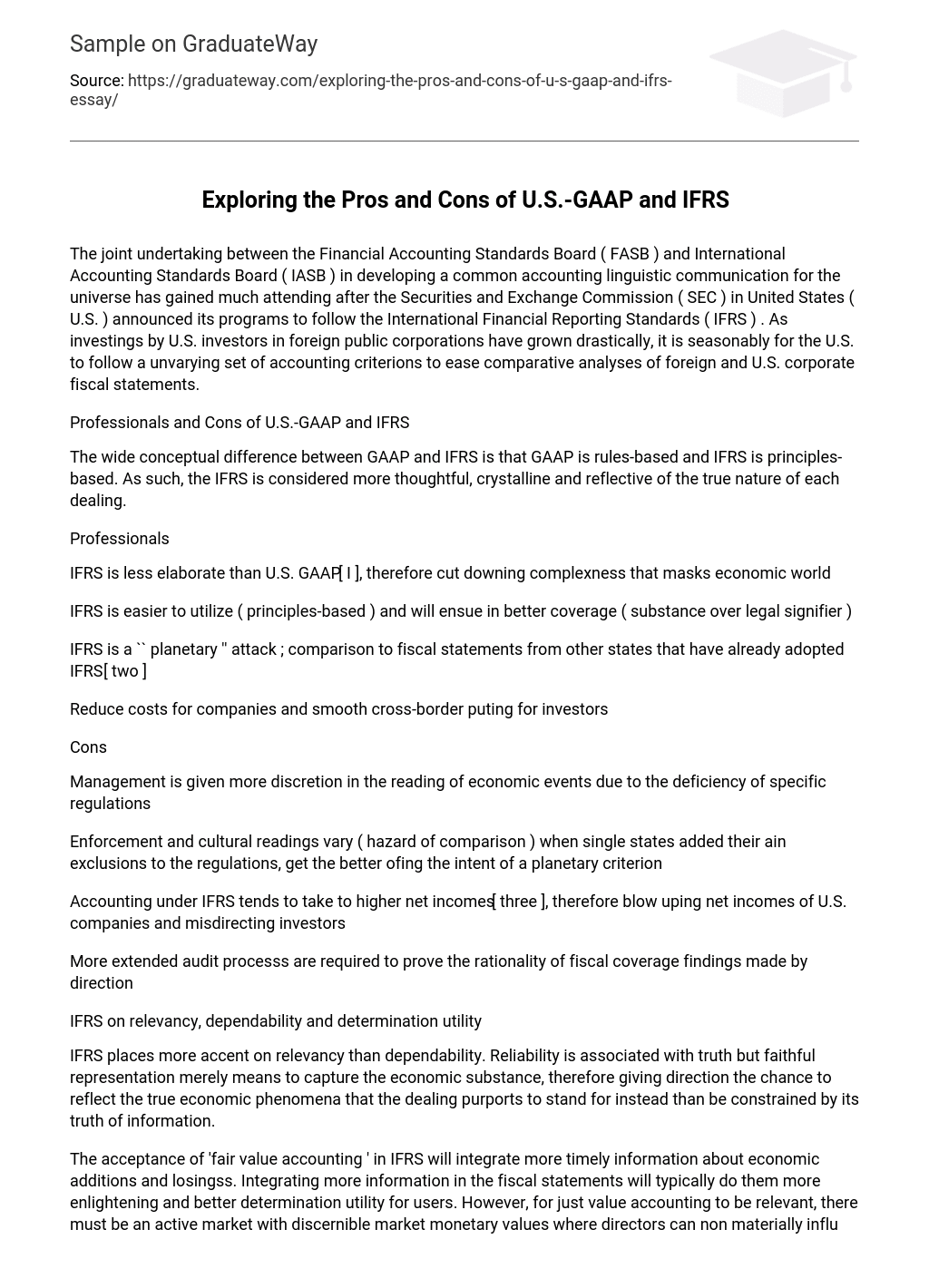The joint undertaking between the Financial Accounting Standards Board ( FASB ) and International Accounting Standards Board ( IASB ) in developing a common accounting linguistic communication for the universe has gained much attending after the Securities and Exchange Commission ( SEC ) in United States ( U.S. ) announced its programs to follow the International Financial Reporting Standards ( IFRS ) . As investings by U.S. investors in foreign public corporations have grown drastically, it is seasonably for the U.S. to follow a unvarying set of accounting criterions to ease comparative analyses of foreign and U.S. corporate fiscal statements.
Professionals and Cons of U.S.-GAAP and IFRS
The wide conceptual difference between GAAP and IFRS is that GAAP is rules-based and IFRS is principles-based. As such, the IFRS is considered more thoughtful, crystalline and reflective of the true nature of each dealing.
Professionals
IFRS is less elaborate than U.S. GAAP[ I ], therefore cut downing complexness that masks economic world
IFRS is easier to utilize ( principles-based ) and will ensue in better coverage ( substance over legal signifier )
IFRS is a “ planetary ” attack ; comparison to fiscal statements from other states that have already adopted IFRS[ two ]
Reduce costs for companies and smooth cross-border puting for investors
Cons
Management is given more discretion in the reading of economic events due to the deficiency of specific regulations
Enforcement and cultural readings vary ( hazard of comparison ) when single states added their ain exclusions to the regulations, get the better ofing the intent of a planetary criterion
Accounting under IFRS tends to take to higher net incomes[ three ], therefore blow uping net incomes of U.S. companies and misdirecting investors
More extended audit processs are required to prove the rationality of fiscal coverage findings made by direction
IFRS on relevancy, dependability and determination utility
IFRS places more accent on relevancy than dependability. Reliability is associated with truth but faithful representation merely means to capture the economic substance, therefore giving direction the chance to reflect the true economic phenomena that the dealing purports to stand for instead than be constrained by its truth of information.
The acceptance of ‘fair value accounting ‘ in IFRS will integrate more timely information about economic additions and losingss. Integrating more information in the fiscal statements will typically do them more enlightening and better determination utility for users. However, for just value accounting to be relevant, there must be an active market with discernible market monetary values where directors can non materially influence. When an active market is non available, just value accounting becomes ‘mark to pattern ‘[ four ]accounting and houses report estimations of market monetary values, which may non be a faithful representation[ V ]of the implicit in plus or liability.
In my position, dependability is a necessary stipulation that must be met for information to be relevant. Fair value steps can be considered dependable merely if the variableness in the scope of sensible just value estimations is non important.
Therefore, there is the hazard that bad future income may be used to warrant describing the plus at a higher carrying sum, which, in bend, would ensue in describing a bad addition. It besides means that a important proportion of a company ‘s reported income could good be represented by deliberate net nowadays value growing, non the consequences of existent minutess.
In add-on, powerful local economic and political forces will take to an uneven execution of the IFRS, thereby taking to increased information processing costs, by burying accounting incompatibilities at a deeper and less crystalline degree than more readily discernible differences in criterions. Hence, investors may be misled into believing that there is more uniformity in pattern than it really is.
Therefore, merely when there is balance between relevancy and dependability, determination utility of fiscal statements to describe on stewardship and supply utile information to show and possible investors can be achieved.
Improvement in accounting quality and rating of houses
Although the acceptance of the IFRS in the U.S. will necessarily enforce brawny passage costs[ six ], the move will presumptively better accounting quality and the rating of houses as it: reflects economic additions and losingss in a more timely manner than U.S. GAAP, makes net incomes more enlightening and provides more utile balance sheets ( with just value accounting )
With improved fiscal statement information, this should take to more-informed rating in the equity markets and accordingly, lower hazard to investors. Small investors are less likely than institutional investors to be able to expect fiscal statement information from other beginnings so improved fiscal coverage quality allows them to vie better with professionals and reduces the hazard of inauspicious choice[ seven ].
Reducing the cost of treating fiscal information will besides increase the efficiency in which the stock market incorporates it in monetary values and therefore, with better house rating, investors can be expected to derive from increased market efficiency. Corporations might besides profit from a decrease of its cost of capital with increased market deepness[ eight ]and lower bid-ask spread[ nine ].
With just value accounting, reported net incomes are less noisy and hence, accounting information are more accurate and more ‘value relevant. ‘ However, investors in the U.S. will necessitate to be more discerning in separating between nonsubjective andsubjective figures, between realised additions and losingss, and additions and losingss based on conjectural computations.
With the acceptance of IFRS, the balance sheet becomes the primary vehicle for conveying fiscal information to investors. As all assets and liabilities are recorded at just value on balance sheet day of the month, the Price/Book ratio will be equal to 1.0.
Consequently, accounting quality is improved as the balance sheet satisfies the rating aim while the income statement provides information about the hazard exposure[ x ]and direction ‘s public presentation.





